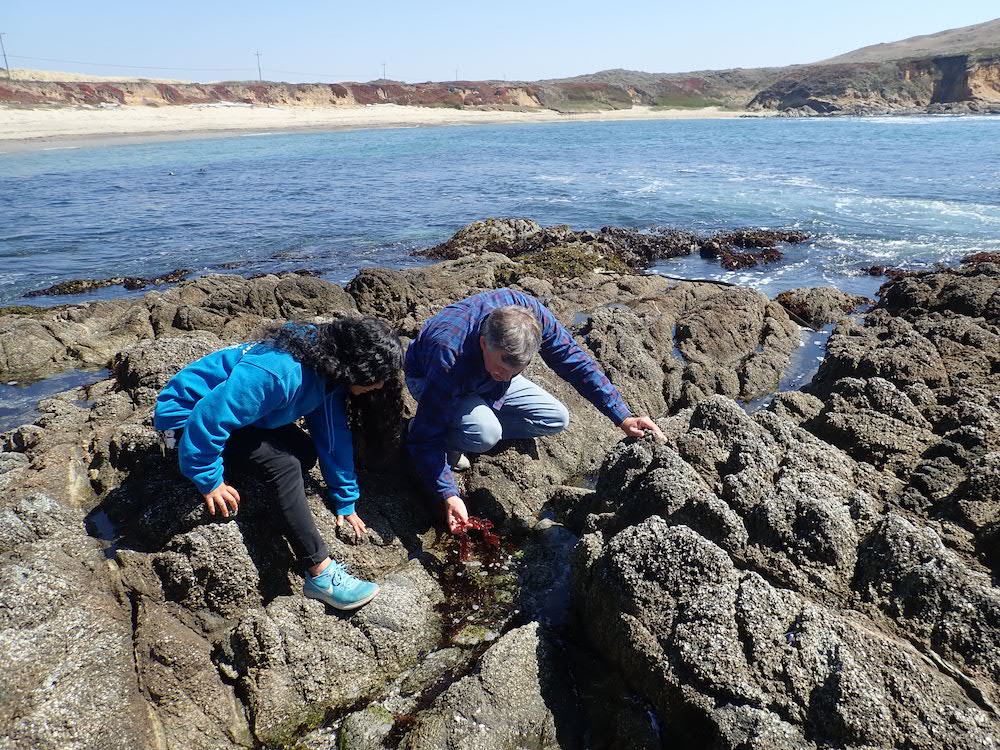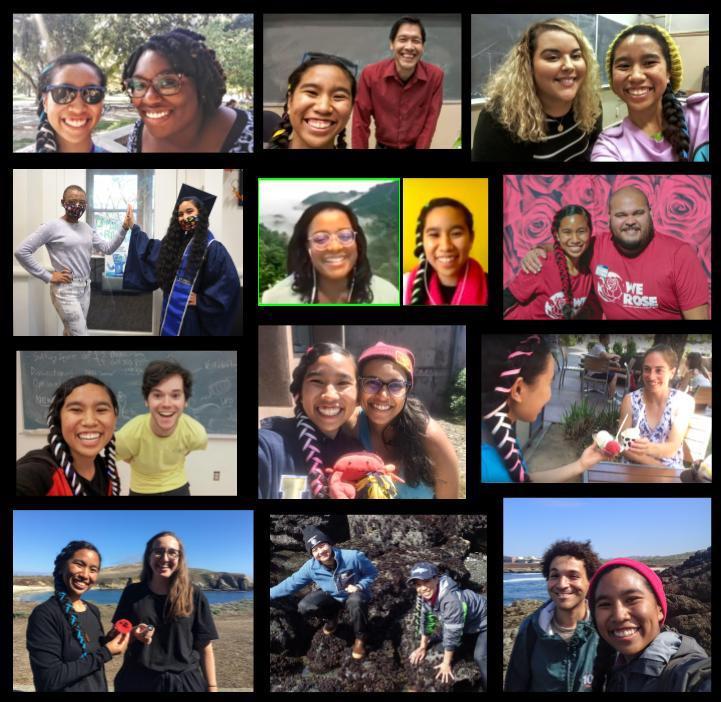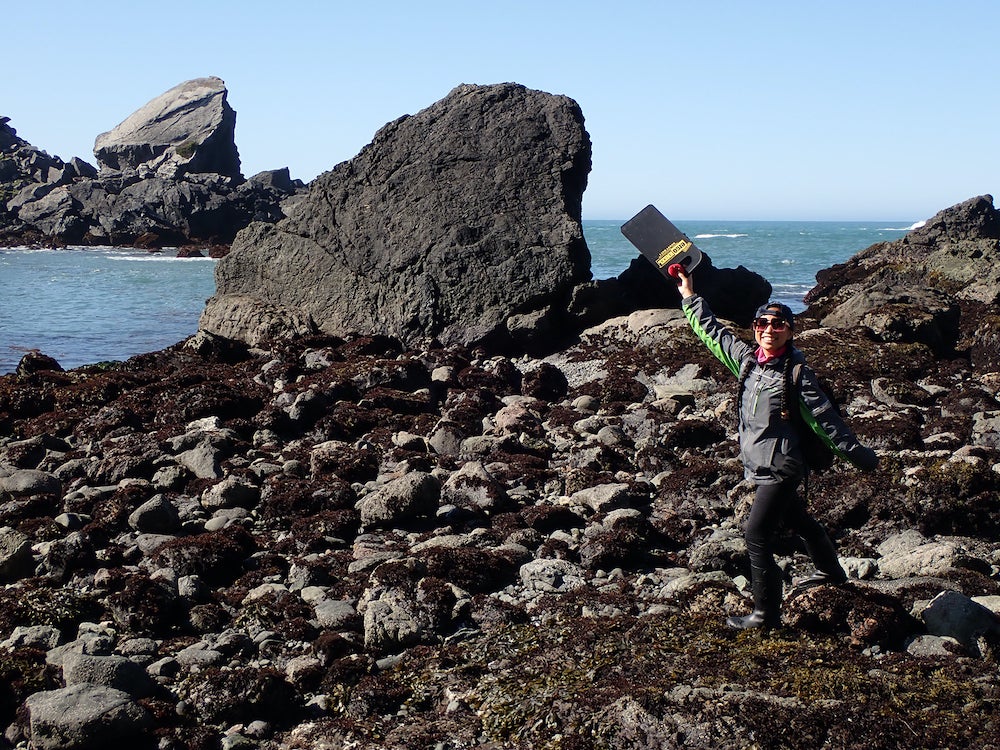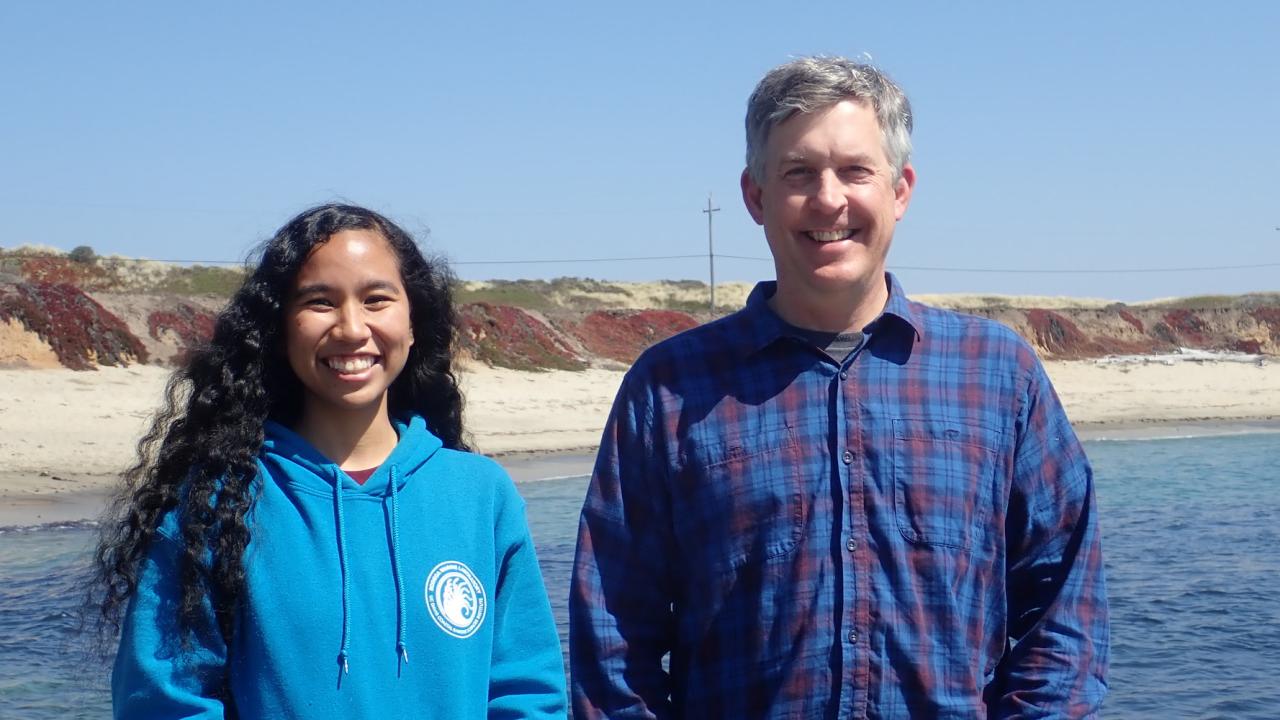Interacting with your professors can be one of the most rewarding parts of your experience as an undergraduate student. Many students benefit greatly from having a professor who serves as a mentor — that is, someone in your area of interest who guides, advises, and supports you to help advance your education and career.
In our case, Jacquie was an undergraduate at UC Davis majoring in marine and coastal science who first met Professor Sanford when she took his Invertebrate Biology class (EVE 112) during Winter 2020. Professor Sanford was impressed by Jacquie’s enthusiasm and amazing lab notebook and encouraged her to take his summer courses at Bodega Marine Laboratory (BML). Jacquie excelled in these small, hands-on courses at the marine lab and became fascinated by carnivorous snails. She then applied for (and received!) a scholarship from the Aquarium of the Pacific to return to BML to conduct an independent research project on sea anemones under Professor Sanford’s mentorship.
Over the past few years, we have both grown professionally and learned a lot from working together. Although finding a mentor might seem challenging at first, in this blog post we offer some tips to help make this process easier!
First, what are some advantages of having a professor as a mentor?

- A mentor offers you encouragement and advice to support your growth and development as a student.
- Mentors are a great source of information regarding possible career paths.
- Getting to know a professor will allow them to write you more detailed and effective letters of recommendation when you apply for jobs and other opportunities in the future.
- Mentors can often connect you with hands-on experiences outside the classroom; for example, inviting you to gain research experience by working in their lab.
OK, so how can I find a professor to serve as my mentor?

1. Identify potential mentors
One of the most natural ways to start interacting with a potential mentor is by taking a class that they teach. For example, if you are thinking about careers in marine science, you can look at UC Davis websites to see which professors are marine scientists who are doing research that sounds interesting. Then, if you think you might want to have one of these professors as a mentor, try taking a class that they teach!
2. Attend class regularly, work hard, and be engaged
Sometimes students think they are largely anonymous in class. In reality, most professors pay close attention and learn which students are in their class. Even if your grades are not as high as you might like, professors definitely take note of students who are excited about learning. It is also not a problem if you are a quiet student — professors will be able to tell if you are genuinely interested in the subject, and they will naturally be more receptive to serving as your mentor.
“One way I’ve tried to make a good first impression is to sit towards the front of class. Then early in the quarter, I will walk up to the professor after lecture, introduce myself, and share what I’m most excited about for the class. Making a good first impression helped me be more confident about approaching professors later on.” —Jacquie Rajerison
3. Establish a line of communication with a potential mentor

This might begin with asking your professor questions about the course material during or after lecture. Emailing a professor with a thoughtful question about the lecture material is also a great way to start communicating and help you to get noticed by a potential mentor.
4. Get to know your professor better
Talking with a professor after lecture or attending office hours is an excellent way for a potential mentor to get to know you. Some students find the idea of talking with professors a bit intimidating at first, but most professors are very friendly and approachable!
Some students find it easier to start by going to office hours with another classmate. Students sometimes worry that they would just be bothering their busy professors. In reality, professors enjoy meeting students and mentoring students is often one of the most rewarding parts of their job. In addition to asking questions about lecture material, a great conversation starter is to ask for suggestions about how to be successful in their class. You can also talk with your professor about potential careers, how they became interested in their field, or other things you might have in common.
“I had a professor who mentioned that they double majored in art and a STEM major as an undergraduate student. During office hours, I asked them about that experience and mentioned that I also love illustration. That was one way I made a connection that I felt confident reaching out to in the future.” —Jacquie Rajerison
5. Take advantage of structured opportunities
Another way to find mentors is to take advantage of events that promote community building or help students navigate challenges. For example, try attending seminars (i.e., talks about topics of interest that are not associated with a class), club meetings, and panels that interest you. Sometimes professors volunteer to speak at these events and following up with them is a good way to start a connection. Professors who are on panels tend to be very approachable and are often attending these events specifically to meet new students. You can ask your academic advisor or peer advisors about how to sign up for email listservs that announce seminars and other events run by groups in your major.
6. Ask how you can get more experience

Once you have gotten to know a professor a bit, you may decide that they could be a good mentor for you. If so, a good next step is to ask them for advice on how you can find research opportunities related to your interests. Many professors have opportunities for undergraduate students to work in their lab as an intern or research assistant. These opportunities come in many different forms and can represent a variety of levels of commitment. For example, you might volunteer to occasionally help a grad student in their lab with a research project. Or the professor might have a paid summer internship available. Or the professor might be aware of fellowships that you can apply to (with their assistance) to fund a summer research opportunity in their lab. Conducting research with a mentor professor can be an amazing opportunity to build skills and to learn firsthand what a future career might look like.
7. Maintain your connections
Eventually, every class or internship comes to an end. But make an effort to stay in touch with professors who you’ve enjoyed working with. Even after a class ends, don’t hesitate to visit their office hours during the following quarter or send them an email occasionally to see how they are doing and to update them on your recent activities. Maintaining these connections allows you to continue benefiting from their advice and mentorship, and it makes it easier to ask these professors to serve as a reference for future jobs and opportunities.
“A method that I use to maintain connections with a professor is to ask for a selfie with them towards the end of a class. I then send them an email with reasons why I liked their class or the biggest lessons I’ve learned from them, and I attach the selfie we took together. This can strengthen your relationship with an existing mentor or start a line of communication with a potential new mentor.” — Jacquie Rajerison
8. Diversify your portfolio of mentors
You don’t need to limit yourself to only one mentor! It can be valuable to have several mentors who work in various fields of interest or who are at different career stages (e.g., professors, graduate student teaching assistants, and community leaders). Having different mentors will give you a broader and more holistic perspective on career paths, and you’ll have more resources to seek different types of advice.
“The mentors who I have met at UC Davis have been tremendously valuable to me I have been able to leverage their different skills and experiences to help me navigate various challenges along the way. I strongly encourage undergraduate students to seek out mentors who can help support them in their academic and professional journeys!” — Jacquie Rajerison
Resources to connect with mentors at UC Davis
- For general information and resources, explore the Undergraduate Research Center (URC).
- A good source of advice for students interested in undergraduate research experience is the URC's video library. See especially: ”How to Write an Email to Faculty to Convey Your Curiosity and Motivation to Get a Research Position.”
- The Out List helps students, staff, and faculty who identify as part of the LGBTQIA+ community to connect with each other, and foster mentorship, support and community.
- For additional tips on getting to know your professors, check out this blog post, "Get to Know Your College Professors."
Jacquie Rajerison graduated from UC Davis in 2021 with a Bachelor’s degree in Marine and Coastal Science. During her time in UC Davis, she served as a Peer Advising Counselor at the Center for the Educational Opportunity Program, the social media and communications officer in the Marine Science Club, and as a student recruiter for Bodega Marine Lab. In 2022, she was awarded research funding from the Aquarium of the Pacific’s African-American Scholars program.
Eric Sanford is a marine ecologist and a Professor of Evolution and Ecology at UC Davis. In 2015, he received the UC Davis Chancellor’s Award for Excellence in Mentoring Undergraduate Research.
